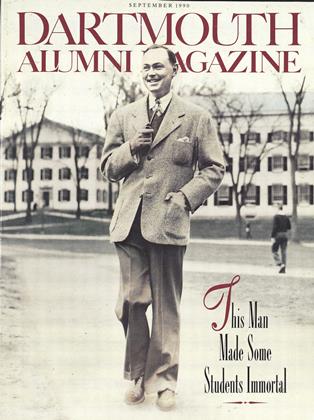The Christa McAuliffe Fellowships, honoring the memory of the teacher killed in the Challenger space shuttle accident in 1986, provide grants to an outstanding teacher in each state and enable the recipients "to develop innovative programs... that will improve the knowledge and skills of teachers and the education of teachers." This year's winner in Vermont is Marc Chabot '81, a chemistry teacher at Woodstock High School.
With his $31,200 grant Chabot is buying 12 Macintosh computers for his high school chemistry classroom, and he himself will develop problem-solving software to meet the widely varying needs of the students in his "mainstreamed" classroom. This will permit weaker students to understand the basic chemical principles of laboratory experiments while stronger students can surpass the basics and address the larger questions that each experiment raises. With an undergraduate degree in chemistry from Dartmouth and a graduate degree in computer programming from UNH, the project is right up Chabot's alley.
Importantly, the software will help students deal with the mathematical aspects of chemistry. Chabot says that some students get so bogged down determining what happened to ten grams of one chemical combined with 15 grams of another that they never get past the numbers to reach an understanding of the principles involved in the experiment. "I'd like to develop programs that will allow them to break the process down, step-by-step. That way they can follow their own progress and identify the point where they're having trouble."
Chabot could have asked for a grant that would have allowed him to take a year off from teaching to pursue his plan. He chose instead to work on the software during the summer and to return to the classroom in the fall in order to begin testing his efforts with his students. It's an indication of Chabot's love of teaching, generated when, as a junior at Dartmouth, he received a Tucker Foundation fellowship to spend six months as an air ambulance coordinator for a hospital in Labrador, Canada.
"Where I went in Labrador," Chabot says, "I found natives living on one side of the river and the whites on the other." Realizing there was a part of the community about which he knew nothing, he decided to volunteer in a small Catholic school in the native section and began working with a 13-year-old Algonquin boy who was not functioning in the classroom. "We started reading Horton Hatches a Who," Chabot recalls. "It didn't seem like much, but he was learning it. I became more and more excited. He was excited. His outlook changed, on everything.
"This bizarre situation was very meaningful to me. Teaching this boy meant something. I came back to Dartmouth, grabbed the handbook, and went over to the education department to sign up for some courses."
While Chabot's efforts will be tested in his classroom this fall, they may eventually be put to work nationally. But whether that happens or not, Marc Chabot is likely to be an inspiration for other teachers and would-be teachers who recognize the need for improving education through innovation.
Marc Chabot '81, left, with Woodstock students.
 View Full Issue
View Full Issue
More From This Issue
-
 Feature
FeatureThe Real Story Behind the Lower Forty Shooting, Angling and Inside Straight Club
September 1990 By Robert Sullivan '75 -
 Feature
FeatureSeidman's Early Withdrawal
September 1990 By Susan Dentzer '77 -
 Feature
FeaturePROBLEM SOLVER
September 1990 By John Aronsohn '90 -
 Feature
FeatureMaking Contact
September 1990 By Kathy Maddock '87 -
 Article
ArticleMOTHERS AND DAUGHTERS
September 1990 By Professor Marianne Hirsch -
 Article
ArticleDR. WHEELOCK'S JOURNAL
September 1990
Kathryn McKenna '91
Article
-
 Article
ArticleDiscovers New Process
March 1938 -
 Article
ArticleWhite Church Pastor
June 1952 -
 Article
ArticleUrban Studies Program
May 1961 -
 Article
Article1965
MAY | JUNE 2016 By —John Rogers -
 Article
ArticleCONTEMPORARY RELIGION
January 1933 By Boynton Merrill '15, D.D. -
 Article
ArticleLife, Lively, Living, Alive
JUNE 1982 By Lisa Campney '82


